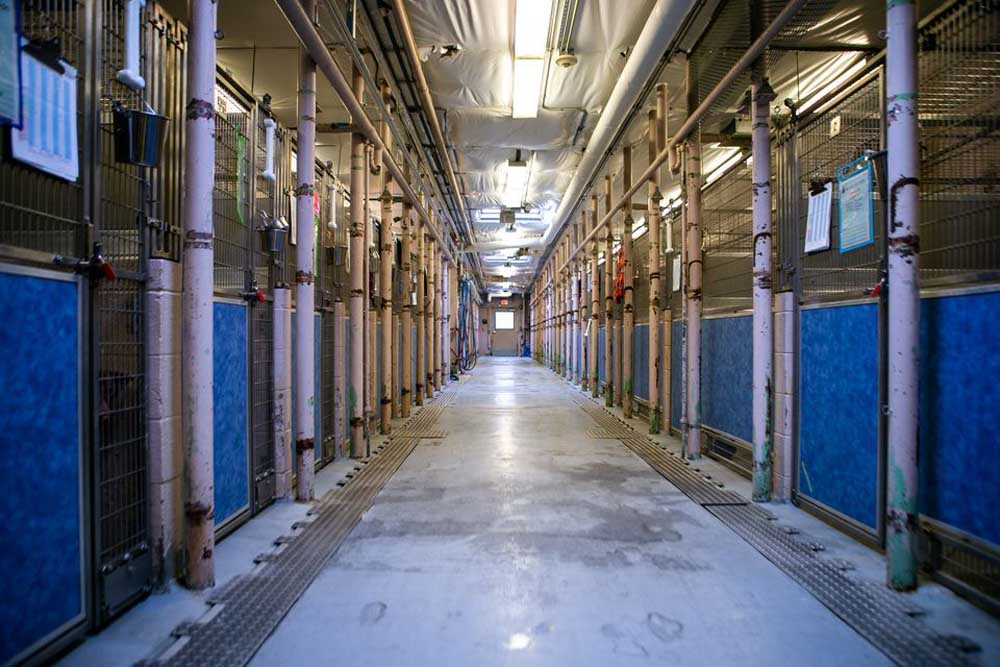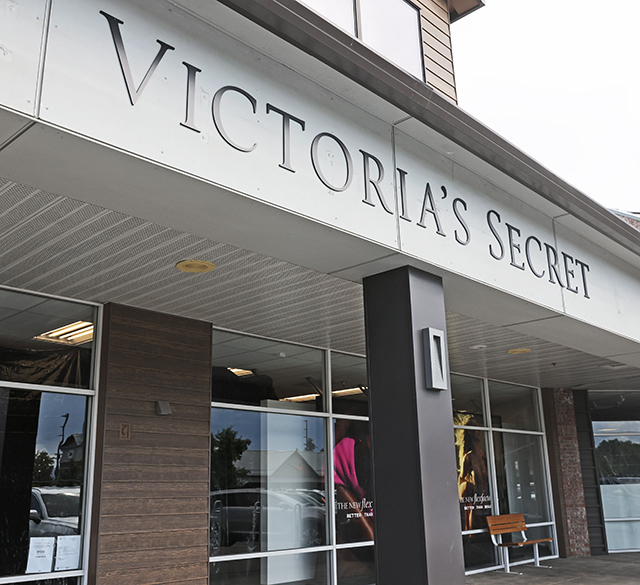Animal lovers say Multnomah County animal shelter has adopted out sick, unvaccinated pets
Published 2:15 pm Monday, February 27, 2023

- The dog kennels at the Multnomah County Animal Services building in Troutdale, Oregon, pictured on Tuesday, Jan. 10, 2023.
Portland resident David Mason feels lucky that his dog LeeLoo is alive after the lack of care that she received at Multnomah County’s animal shelter.
Mason was approved in January to adopt a dog from the county shelter, located in Troutdale. Shelter staffers told him that LeeLoo was not spayed and lacked her rabies vaccine. Other than LeeLoo needing to gain a few pounds, they raised no other concerns about her medical condition, he said.
Trending
But it became clear in the car ride home that something was wrong, he said, because the dog couldn’t stop throwing up. Mason grew so concerned he took her to an emergency clinic the day after he adopted her. A veterinarian diagnosed her with giardia and a kennel cough that had developed into pneumonia.
Mason is among multiple pet adopters and community advocates raising alarm about the wave of sick, unvaccinated and unspayed or unneutered animals that the county animal shelter has allowed to be adopted out since last summer.
He said he paid $4,000 to save LeeLoo’s life. She is now doing better, he said, but he is furious at the shelter.“She’d been in the shelter since Dec. 12 and had been completely ignored with kennel cough and pneumonia and giardia,” he said. “If this is the way they are going to treat these poor dogs, then they shouldn’t be a shelter. It’s absolutely unfair to these poor creatures.”
The shelter is funded to have two veterinarians on staff. But since April, it has had only one who works 30 hours a week Monday through Wednesday. It currently has two openings for veterinary technicians as well, officials said. While shelters across the country are currently navigating shortages in veterinary staff, former employees say a toxic work environment created by Multnomah County Animal Services’ revolving door of leaders is largely to blame for chronic staffing shortages at the shelter.
From June to December of last year, the county adopted out 255 animals that were not spayed or neutered — about 22% of pets adopted in that timeframe — and 104 animals that hadn’t received rabies vaccinations, or about 9%, according to Jessica Morkert-Shibley, a county spokesperson. The county requires animals to be vaccinated against rabies before their owners can obtain licenses for their pets.
Problems at the Troutdale shelter have been well-documented for at least seven years, but county officials failed to make meaningful changes, a review by The Oregonian found. The shelter’s staffing crisis reached a critical level last year as 22 staff members departed, saying they were overworked and undertrained, and citing issues with management and a pattern of animal neglect.People who’ve adopted pets say that has led to animals receiving inadequate medical care — and left new owners blindsided when their pets need significant medical intervention.The county requires adopters to sign a contract that advises them to contact the shelter during business hours if their pets exhibit commonplace medical issues or symptoms of contagious diseases within 14 days after adoption, Morkert-Shibley said. The contract says the shelter will then determine the best course of treatment. It also says that the shelter isn’t responsible for costs adopters incur if they take their pets to another veterinarian.
Trending
But in emergency situations, adopters say, waiting to contact the shelter during business hours isn’t an option.Moses Messenger, who lives in Washington’s Tri-Cities area adopted an Alaskan Malamute from the shelter Dec. 18. He said he grew uneasy when shelter staff failed to ask him basic questions about his home when conducting a phone screening. Still, he agreed to adopt the dog, Kenai.
Kenai’s chart showed that he had been given a dewormer, flea treatment and a rabies vaccine but hadn’t been treated for other illnesses. However, shortly after Messenger adopted him, he said Kenai began having coughing fits and diarrhea. Messenger took him to a veterinarian who diagnosed him with pneumonia and an ear infection. He paid about $2,000 to treat him.
“He’s a wonderful dog, loves our pack, and he’ll never set foot in that building ever again,” Messenger said.
Dogs adopted by without being spayed or neutered goes against national guidelines set by the Association of Shelter Veterinarians, which says “it is unacceptable for organizations to allow shelter animals to breed.”
But the shortage of veterinary staff prompted the shelter last summer to begin adopting out unfixed animals, and in some cases animals that hadn’t received a rabies vaccination, which can only be administered when a veterinarian is present.
Erin Grahek was named the division’s interim director last summer and became its permanent director in September. Even though the shelter allows adoptions of unfixed and unvaccinated pets, she said she believes it is providing adequate medical care to animals. She said the shelter recently started contracting with two additional relief veterinarians who have helped to fill in the gaps.
“In terms of being able to provide medications and treatments and immediate medical needs to all the pets in our care, I would say we’re doing that,” Grahek said.
When the shelter adopts out unfixed pets or those without rabies vaccines, it provides the people who adopt them vouchers to clinics that can complete those procedures. Morkert-Shibley said the decision to implement the voucher system was made “in order to prevent a bottleneck of significantly delayed adoptions due to veterinary availability.”
But there is no way for the shelter to compel adopters to take their pets in for those procedures, and the voucher process has been far from perfect. Only 20 pet owners have redeemed vouchers so far, Morkert-Shibley said, although she said more could be in the process of getting their pets the shots or surgeries. She said the shelter plans to follow-up with adopters who don’t redeem their vouchers. Jessica Berg, development director at Portland-based animal rescue The Pixie Project, said she is concerned about the lasting impact that the shelter’s spay and neuter policy will have on the community.
“More unfixed animals adopted into the community will lead to more unfixed animals,” Berg said. “If you leave unaltered cats outside, you’re going to get more unaltered stray cats. You’re setting people up to adopt one cat and suddenly have 10 cats.”
Last month, Multnomah County Chair Jessica Vega Pederson and Grahek acknowledged that conditions at the shelter needed to be improved and promised action. Vega Pederson last week announced a five-month review that will look at how the shelter can address long-standing structural and management challenges.
But in the interim, volunteers say they remain concerned with the conditions at the shelter, including how the county is approaching adoptions in an effort to combat overcrowding and get animals out the door.
The county said the shelter adopted out 108 animals in the second half of January alone. In comparison, the shelter adopted out only 90 animals last January and an average of 147 animals per month in 2022.
One of the dogs adopted out in January was named Petey.
Petey was transferred to the shelter after being picked up as a stray Dec. 22, records show. He was described in notes as “relaxed” and “wiggly.” But by the time he was adopted out unneutered on Jan. 15, he was being treated for kennel cough and veterinary staff had recently noted that there was bloody nasal discharge on his legs.
Longtime volunteer Kelley Sherman said she was at the shelter the Sunday when management agreed to adopt Petey and another dog to two homeless individuals. Morkert-Shibley said the shelter is in the process of reviewing its adoption guidelines but is focused on removing barriers to adoption and providing “equitable treatment for community members with limited income or varying housing arrangements.”
Sherman said Petey had been coughing and sneezing the morning of his adoption and volunteers had to rush to find him a coat because they knew he was going to be living outdoors.
Four days after the adoption, records show that a woman observed a man asking people at Eastport Plaza if they wanted to buy Petey for $5. She convinced the man to give her Petey, and then arranged for Petey to be returned to the shelter.
Petey was then adopted out to a family with a dog and a cat, despite shelter staff recommending that he be tested for aggression toward dogs based on his behavior when a dog walked by his kennel. He was returned five days later after he attacked the family’s dog and bit off a piece of its ear, records show. He was euthanized several days after that.
“I don’t know who to go to or how to change things,” Sherman said. “It seems like there’s no accountability at the shelter.”








